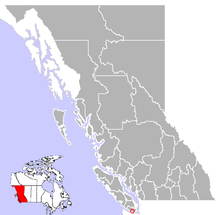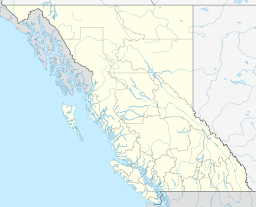Sooke
| Sooke, BC | |
|---|---|
| District municipality | |
| District of Sooke[1] | |
|
| |
 Location of Sooke in British Columbia | |
| Coordinates: 48°22′34″N 123°44′16″W / 48.37611°N 123.73778°WCoordinates: 48°22′34″N 123°44′16″W / 48.37611°N 123.73778°W | |
| Country |
|
| Province |
|
| Region | Vancouver Island |
| Regional district | Capital Regional District |
| Incorporated | December 7, 1999 |
| Government | |
| • Mayor | Maja Tait |
| • Councillors | Bev Berger, Rick Kasper, Ebony Logins, Brenda Parkinson, Kevin Pearson, Kerrie Reay |
| Area | |
| • Total | 56.72 km2 (21.90 sq mi) |
| Elevation | 50 m (160 ft) |
| Population (2011) | |
| • Total | 11,435 |
| • Density | 201.6/km2 (522/sq mi) |
| • Demonym | Sookite[2] |
| Time zone | PST (UTC-8) |
| Highways | 14 |
| Waterways | Strait of Juan de Fuca |
| Website | District of Sooke |
Sooke /suːk/ is a district municipality situated on the southern tip of Vancouver Island, Canada. About a 30 minute drive from the city of Victoria (the capital of British Columbia), Sooke is considered the westernmost of the Greater Victoria region's "Western Communities." It is situated to the north and west of the Sooke Basin.
Education
Sooke is a part of the School District 62 Sooke. There is one high school, Edward Milne Community School, and one junior high school, Journey Middle School. Continuing adult education programs are offered by the Edward Milne Community School (EMCS) Society, which also operates with day, evening and weekend programs.
Tourism and recreation
Sooke's popularity as a scenic tourist destination has existed for generations. Well-known destinations in Sooke, such as Whiffin Spit Park, the Sooke Potholes Regional Park, and adjacent Sooke Potholes Provincial Park attract visitors both locally and from around the world. Sooke is also home to the Sooke Region Museum and Visitor Centre; where visitors and locals are able to get information on regional attractions and history. The area's popularity has increased as a base for visiting the wilderness parks of Vancouver Island's southwest coast — the West Coast Trail and the Juan de Fuca Provincial Park which includes the now highly popular Juan de Fuca Marine Trail. Sooke, BC is also famous for its beaches just on the outskirts of its neighboring communities such as Shirley and Jordan River. These beaches include Sandcut, French beach, Fishboat bay, China beach, Mystic beach, and more.
Back country recreation, or off-road recreation brings a constant stream of 4X4s, quads, ATVs, dirt bikes, and home built off-highway vehicles through Sooke as people search out back country access. Hundreds of kilometres of logging roads thread through the hills north of Sooke in the Rural Resource Lands of the Juan de Fuca electoral area, enabling access to several community lakes and small reservoirs. Two large reservoirs, Bear Creek and Diversion, are popular destinations north and west of Sooke.
Mountain biking is growing in popularity in British Columbia, and Sooke is establishing itself as a destination for the sport. Local advocacy groups such as the Sooke Bike Club are working to have areas such as Broom Hill set aside as parkland.
The Galloping Goose Regional Trail, part of the Trans-Canada Trail, runs through Sooke and is a popular cycling route to Victoria.
Arts community
The vibrant arts community of Sooke enjoys the annual Sooke Fine Arts Festival (in its 28th year in 2014) which brings hundreds of tourists to Sooke each summer by featuring the adjudicated art of local and regional artists. Sooke is known for its wealth of painters, writers, sculptors, potters, fabric artists, jewellery crafters, and more. The Sooke Community Arts Council plays a large role in fostering art in the region. The Sooke Harbour House art gallery is a main display opportunity for many local artisans.
Real estate
In Sooke, prices rose then fell in 2011—from January to March prices climbed from $428,383 to the $447,000 range, but reached a low of $368,480 in May and settled at $395,120 by December (though in December 2010 the price was similar at $380,020). As per "The Sooke News"“Last year, 199 single-family homes sold in Sooke, including East Sooke, Shirley, Jordan River and Port Renfrew. The average sale price was $423,642. This is lower than 2010, which saw 230 single-family homes sell, with an average price of $454,695.
Demographics
| Canada 2006 Census | Population | % of Total Population | |
|---|---|---|---|
| Visible minority group Source:[3] | Chinese | 90 | 0.9% |
| South Asian | 120 | 1.2% | |
| Black | 80 | 0.8% | |
| Filipino | 30 | 0.3% | |
| Latin American | 20 | 0.2% | |
| Southeast Asian | 20 | 0.2% | |
| Arab | 0 | 0% | |
| West Asian | 20 | 0.2% | |
| Korean | 15 | 0.2% | |
| Japanese | 15 | 0.2% | |
| Other visible minority | 20 | 0.2% | |
| Mixed visible minority | 25 | 0.3% | |
| Total visible minority population | 450 | 4.6% | |
| Aboriginal group Source:[4] | First Nations | 390 | 4% |
| Métis | 0 | 0% | |
| Inuit | 0 | 0% | |
| Total Aboriginal population | 390 | 4% | |
| White | 8,850 | 91.3% | |
| Total population | 9,690 | 100% | |
Neighbourhoods
(in order from east to west)
- North Sooke
- Saseenos
- Milne's Landing
- Sunriver Estates
- Sooke Town Centre or "Upsooke"
- Broom Hill
- Whiffin Spit
- Otter Point
- Kemp Lake
Neighbouring communities
- Metchosin - East of Sooke
- East Sooke - South of Sooke
- Otter Point - West of Sooke
Publications
- Paperless, electronic news is provided by Sooke.PocketNews.ca, owned and operated by Britt Santowski, since January 2015.
- The long-established weekly newspaper is the Sooke News Mirror, edited by Kevin Laird and one of more than 70 Black Press Media community papers in B.C.
- The independent weekly Sooke Voice News began publication in January, 2012 under the direction of publisher/editor Mary P. Brooke.[5]
- The Rural Observer, edited by Terri Alcock, is a non-profit monthly magazine published since 2004 by the Juan de Fuca Rural Publication Society for readers in the neighbouring communities of Shirley, East Sooke and Otter Point.
Notable residents
- Canadian poet, novelist and playwright Marilyn Bowering lives in the Sooke area.
- Carl Heinrich, winner of Top Chef Canada (season 2), grew up in Sooke and attended Edward Milne Community School.
- Bryce Soderberg, bassist and vocalist for American rock band Lifehouse.
References
- ↑ "British Columbia Regional Districts, Municipalities, Corporate Name, Date of Incorporation and Postal Address" (XLS). British Columbia Ministry of Communities, Sport and Cultural Development. Retrieved November 2, 2014.
- ↑ http://issuu.com/blackpress/docs/i20140910100040293/21
- ↑ "Community Profiles from the 2006 Census, Statistics Canada - Census Subdivision". 2.statcan.gc.ca. 2010-12-06. Retrieved 2013-04-13.
- ↑ "Aboriginal Peoples - Data table". 2.statcan.ca. 2010-10-06. Retrieved 2013-04-13.
- ↑ http://www.sookevoicenews.com/about.htm
External links
- The Sooke Region Museum and Visitor Centre
- Travel and Tourism information for the Sooke area
- The District of Sooke municipal government website
- Sooke PocketNews
- Sooke News Mirror newspaper
- MapleLine Magazine - quarterly Sooke news issues magazine
- Rural Observer
- Sooke Bike Club
